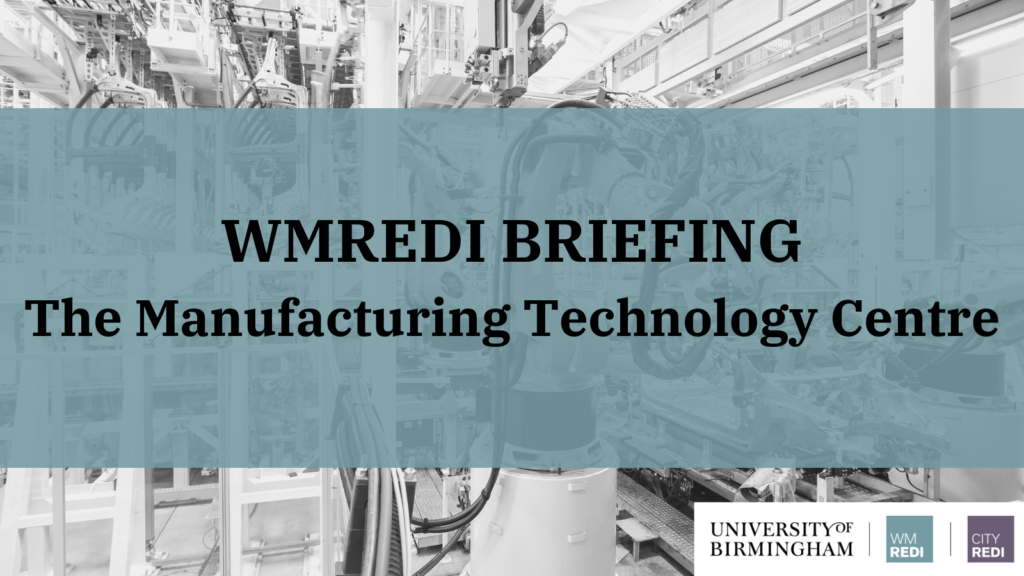
In this policy briefing, Robert Lynam, Dr Chloe Billing and Professor Simon Collinson look at the Manufacturing Technology Centre and its impact in the West Midlands. It outlines the findings from one of our WMREDI projects focused on examining regional innovation ecosystems and the relationships between universities, local firms, entrepreneurship, innovation, technology transfer, and knowledge exchange as contributors to different kinds of growth. We know that regional solid innovation systems underpin more vital economic growth pathways, tend to be more competitive and resilient, and benefit both firms and local communities. Find out more about this project.
The Manufacturing Technology Centre (MTC) is an independent Research and Technology Organisation which was founded in 2010 by four institutions – Loughborough University, the Universities of Birmingham and Nottingham, and TWI – with the aim of bridging the ‘valley of death’ between academia and industry (the persistent gap in effective communication, collaboration, and knowledge transfer between the two distinct cultures).
The centre develops innovative technologies, manufacturing processes and supply chain processes in partnership with a multitude of institutions of all sizes, ranging from small and medium-sized enterprises (SMEs) to Tier 1s and large, national original equipment manufacturers (OEMs). Combining highly advanced manufacturing equipment and highly-skilled engineers with leading expertise creates high quality and agile but low-risk environment for manufacturing innovation and development on an industrial scale. It functions as one of the seven High-Value Manufacturing (HVM) Catapult Centres which work with industry to add value to, and thus increase the competitiveness of, private and public sector organisations. Since its inception, it has worked with and helped hundreds of companies – many of whom have become MTC members – manufacture more efficiently, cost-effectively, and of higher quality.
This policy briefing, alongside a systematic review of the literature, provides a strong foundation for the next phase of our research.
This will involve a ‘deep dive’ case study on MTC, aimed at building an understanding of the specific regional contribution the fixed asset makes and the factors that constrain its innovation/productivity growth.
Our project will work to identify the size, scale, employment, turnover, and growth of MTC, indirect and indirect terms using proxy measures and multipliers.
We will then compare the commercial and non-commercial impacts of MTC, identifying any social/ environmental/ economic trade-offs. This impact analysis will help identify different forms of regional economic growth that can be attributed to university-related investments.
Download the policy briefing here.
This blog was written by Robert Lynam, Dr Carolin Ioramashvili, Dr Chloe Billing and Professor Simon Collinson, City-REDI / WMREDI, University of Birmingham.
Disclaimer:
The views expressed in this analysis post are those of the authors and not necessarily those of City-REDI or the University of Birmingham.
